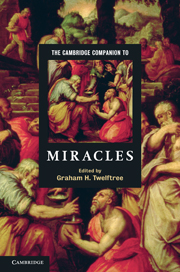Introduction
Miracle in an age of diversity
Published online by Cambridge University Press: 28 May 2011
Summary
In their various ways, atheist, agnostic and believer alike negotiate the problem of miracle: their possibility, their apprehension and, if any, their meaning. But for the first time in recent history it is increasingly obvious that we do not travel alone. Not only is this the experience of those living in the West, those cultures extending from the rim of the north Atlantic. With greater communication, travel, immigration and trade, it is apparent that miracle is also a problem in the East for the Hindu, Muslim and Buddhist, as well as for the Christian and Jew in the global south.
Not since the religions of Egypt, Syria, Persia and Asia Minor found their way into the Graeco-Roman world have the boundaries between so many cultures been so porous and the problem of miracle so interesting. In the Graeco-Roman world, late in the second century ce, the philosopher Celsus (probably in Alexandria) was pouring scorn on Christians who, ‘for a few obols make known their sacred lore in the middle of the market-place and drive demons out of people and blow away disease’ (Origen, Against Celsus 1.69). In the same period, the philosopher-satirist Lucian of Samosata (modern Samsat in southeast Turkey) says in relation to the followers of Peregrinus: ‘By Zeus, it would be nothing unnatural if, among all those dolts [who witnessed his death] that there are, some should be found to assert that they were relieved of quartan fevers by him’ (The Passing of Peregrinus 28). In poking fun at such views he said, ‘we have a powerful antidote to such poisons [the stories] in the truth and in sound reason brought to bear everywhere. As long as we make use of this, none of these empty foolish lies will disturb our peace’ (The Lover of Lies 40).
- Type
- Chapter
- Information
- The Cambridge Companion to Miracles , pp. 1 - 16Publisher: Cambridge University PressPrint publication year: 2011



